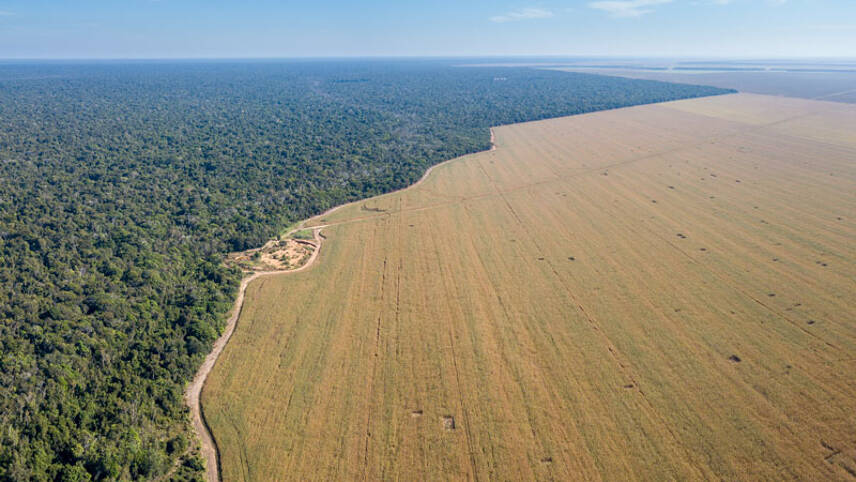Register for free and continue reading
Join our growing army of changemakers and get unlimited access to our premium content

Pictured: A soybean farm bordering land protected for Indigenous peoples, Brazil
The first priority on the agenda is to encourage nations to bolster their plans for developing sustainable land-use systems domestically and internationally.
Nations are being invited to sign a new Leaders Declaration on Food Systems, Agriculture and Climate Action. In doing so, they will commit to embedding plans to reduce food system emissions in their Nationally Determined Contributions (NDCs) – their plans for playing their part in delivering the Paris Agreement.
At the moment, only a minority of nations make any reference to food systems in their NDCs, and even fewer have time-bound, numerical commitments to cut emissions.
This is despite the fact that land use accounts for at least a quarter of global annual emissions and that food production is the top historic driver of deforestation and nature degradation. Moreover, 70% of global freshwater use by humanity each year is attributable to agriculture.
The UAE, as host of COP28, has already updated its own NDC to include food systems emissions. It has also set a top-level commitment to reduce absolute emissions by 40% by 2030.
Nations looking to set appropriate emissions targets for food systems will be assisted by a new roadmap to 1.5C for the sector. This was promised by the UN Food and Agriculture Organization (FAO) at COP27. It will be similar to the roadmaps provided by the International Energy Agency in 2021 for global power systems.
The UN FAO has this week confirmed that it is on track to provide the roadmap by COP28.
Commenting on the news, the FAIRR Initiative’s policy director Helena Wright said: “Integrating emissions from food systems into Nationally Determined Contributions would necessitate a step-change in government policy governing how we produce and consume food. Investors have been calling for this since COP26 when a group representing $12tn in assets called for all G20 nations to disclose specific targets for emissions reduction in agriculture within or alongside their NDC commitments.”
Separately from NDCs, many nations signed up to a new global commitment to reduce their methane emissions by 30% by 2030 at the last COP. Investors and green groups are pushing these nations to include methane from food systems as well as fossil fuels in their plans.
Private sector engagement
COP28 director-general Majid Al Suwaidi recently told edie that the involvement of non-state actors, including businesses, at COPs, is crucial. This is because private capital is needed to turn commitments from nations into action.
This ethos is clear to see in the new Food Systems and Agriculture Agenda. The COP28 presidency has outlined plans to invite large businesses, plus farmer and producer organisations, to develop a new partnership mapping a pathway to a more sustainable future. Among the topics to be included in the pathway are food waste, climate resilience, nutrition and sustainable production methods.
On this latter point, the UAE has launched a new drive to promote the adoption of regenerative agriculture at scale. It will be supported by the UN Climate Change High Level Champions, the World Business Council for Sustainable Development (WBCSD) and Boston Consulting Group (BCG). Regenerative practices are only used on 15% of cropland globally at present and this proportion will need to exceed 40% under the Paris Agreement.
The COP28 presidency has also pledged to “identify investment in a limited number of high-impact innovations, with a focus on smallholder and climate vulnerable communities and producers”. This forms part of a broader commitment from the UN to leverage existing finance mechanisms to unlock new flows to agriculture innovation.
Hot topic
The announcements on food and agriculture come hot on the heels of the first major meeting of energy ministers ahead of COP28, intended to foster global agreements on new energy transition commitments.
This meeting took place in Goa, India, over the weekend. An agreement was reached on a commitment to double the rate of energy efficiency improvements. There was also strong, united support for the Global Cooling Pledge which aims to coordinate international action on sustainable cooling.
Cooling is the fastest-growing cause for energy use in buildings. Danfoss estimates that the demand for space cooling has been increasing by as much as 4% per year since 2000. Increases are especially visible at present, with heatwaves gripping large parts of the US, Asia and southern Europe. This was also the case during last summer of record-breaking extreme weather.
Clashes of opinion over carbon capture and emissions removals meant that no final communique was produced in Goa this weekend. Energy ministers will next meet in New York this September, in another attempt to foster stronger agreement before COP28.


Please login or Register to leave a comment.